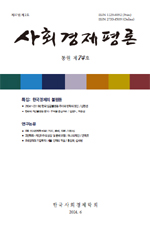- 영문명
- Comparative Study on Poverty Alleviation Effects of Basic Income and Household-level Negative Income Tax
- 발행기관
- 한국사회경제학회
- 저자명
- 이건민(Gunmin Yi)
- 간행물 정보
- 『사회경제평론』제78호, 29~86쪽, 전체 58쪽
- 주제분류
- 경제경영 > 경제학
- 파일형태
- 발행일자
- 2025.10.30

국문 초록
본 연구는 40% 정률소득세-기본소득 모형을 반영하는 기본소득과 가구 소비에서의 규모의 경제를 고려하면서 가구 단위로 지급되는 음의 소득세의 빈곤 개선 효과를 노동공급효과를 반영하여 실증분석하였다. 분석 결과, 가구 단위 지급이 개인 단위 지급보다 빈곤 개선의 효과성이 낮을 것이라는 가설이 성립하였다. 이와는 반대로, 가구 단위 지급이 개인 단위 지급보다 빈곤 개선의 효율성이 높을 것이라는 가설은 성립하지 않은 것으로 나타났다. 이러한 분석 결과는 노동공급효과가 반영될 경우, 가구 단위로 지급하는 것이 빈곤 개선의 효과성과 효율성 면에서 바람직하지 않음을 시사한다. 마지막으로 본 연구의 이론적 기여와 정책적 함의, 한계와 후속연구 제언을 제시하였다.
영문 초록
This study analyzed the poverty alleviation effects of the basic income reflecting the 40% Universal Basic Income-Flat Income Tax (UBI-FIT) model and the negative income tax paid to households while considering the economies of scale in household consumption. Using the 13th wave of the National Survey of Tax and Benefit (NaSTaB), the empirical analysis was conducted by reflecting the labor supply effect. The results of the analysis showed that the hypothesis that household-level payment would be less effective in poverty alleviation than individual-level payment was valid. On the contrary, the hypothesis that household-level payment would be more efficient in poverty alleviation than individual-level payment was not valid. These results suggest that when the labor supply effect is considered, household-level payments are not desirable in terms of the effectiveness and efficiency of poverty alleviation. Finally, the theoretical contributions, policy implications, limitations, and suggestions for follow-up research of this study were presented.
목차
Ⅰ. 서론
Ⅱ. 이론적 검토
Ⅲ. 분석체계
Ⅳ. 분석 결과
Ⅴ. 결론
참고문헌
해당간행물 수록 논문
참고문헌
최근 이용한 논문
교보eBook 첫 방문을 환영 합니다!

신규가입 혜택 지급이 완료 되었습니다.
바로 사용 가능한 교보e캐시 1,000원 (유효기간 7일)
지금 바로 교보eBook의 다양한 콘텐츠를 이용해 보세요!


